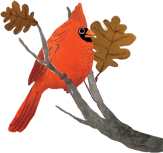- Students and teachers need to dress for the weather. Much of the class takes place outside.
- Students should practice reading thermometers before coming to class.

Weather
| Title | Weather |
| Audience | 4th Grade |
| Offered | April - May |
| Length | 1 hr. 50 minutes (if time allows, students will look around in the Exploration Hall) |
Preparing for this Class
Class Description
This class focuses on the properties of air and how the “sea of air” (the atmosphere) we live in controls our weather. After introducing various tools a meteorologist uses to make predictions about the weather, students will move from station to station using those same tools to make their own weather predictions. Students will also learn about some of the ways humans impact our “sea of air” through acid rain and holes in the ozone. Finally, students will practice and test their skills reading thermometers with a fun animal survival trail game that relates to how animals survive seasonal changes.
Correlation to MN Science Standards
- Recognize that when scientific investigations replicated they generally produce the same results, and when results differ significantly, it is important to investigate what may have caused such differences. For example, Measurement errors, equipment failures, or uncontrolled variables. (5.1.1.1.2)
- Measure temperature, volume, weight and length using appropriate tools and units. (4.2.1.1.1)
- Measure, record, and describe weather conditions using common tools. (2.3.2.2.1)
Science Vocabulary
|
Weather Meteorologist Atmosphere Troposphere Temperature Thermometer |
Barometer Millibar Front Wind Wind Vane Anemometer |
Condensation Evaporation Water Vapor Humidity Cloud Cirrus Cloud |
Cumulus Cloud Stratus Cloud Precipitation Rain Gauge Water Cycle
|









